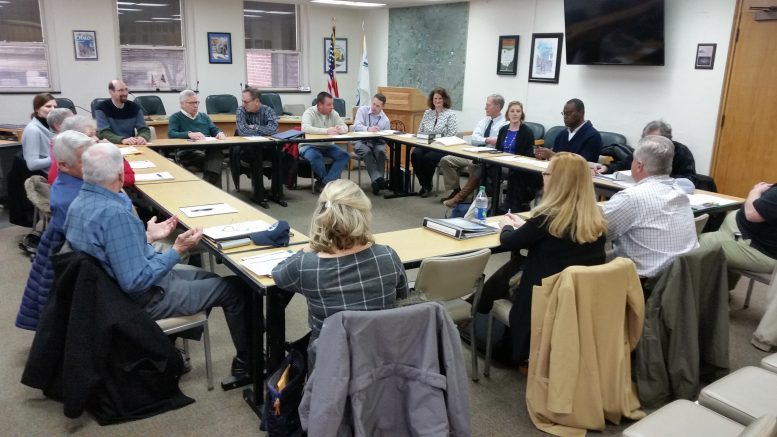By JAN LARSON McLAUGHLIN
BG Independent News
City charters are not exactly riveting reading. They set the ground rules for how city government is organized and how it operates.
Bowling Green officials pride themselves on the city’s workable city charter. Unlike the unwieldly state charter which fills up several thick books, Bowling Green’s charter fits in a tidy 14-pages.
But officials also know the city charter needs a refresher.
“We all know the import of this process,” Mayor Dick Edwards said at the first meeting of the charter review committee last month.
The last review of Bowling Green’s charter was 17 years ago.
“It’s a little bit overdue,” Edwards said, suggesting that the city adopt a schedule like other cities of reviewing the city charter every 10 years. “I think that would be very healthy.”
So the city has established a citizen committee to review the charter. The newly-formed city charter review committee includes co-chairs Shannon Orr and Jeff Crawford, and members Evelyn Bachman, Les Barber, Julie Broadwell, Sylvia Chandler, Holly Cipriani, Bill Culbertson, Greg Dickerson, John Fawcett, Gary Hess, Mark Hollenbaugh, Sarah Klotz, Chet Marcin, Rachel Phipps, Andy Schocket and Tom Walton.
“I believe this is very important work,” City Council President Mike Aspacher said to the members at their first meeting. “Perhaps our residents’ expectations of how the city serves them have evolved. Are we serving our residents in ways they expect us to?”
Municipal Administrator Lori Tretter emphasized that while city officials will help the charter review committee, they would not steer the process.
Any changes recommended by the committee will be put into ordinance form by City Attorney Mike Marsh. In order to become part of the charter, the changes must get voter approval, and by law may only be voted upon in a November election.
Gary Hess, who also served on the last charter review committee in 2001, explained that term limits were discussed during that review. “In the end, it was generally agreed that term limits were handled by the electorate,” he said.
During that review, committee members also talked about making city council non-partisan and making all council members at-large rather than some representing wards. Marsh explained that all the proposed charter amendments that year failed on the ballot.
Two of the proposed amendments suggested a change allowing the city to hire police and fire chiefs from outside the city forces. There was strong campaigning against those amendments, Marsh said, and since there was no campaigning for any of the other amendments, they all failed.
The public will have a chance to weigh in on the city charter during at least two public forums – on March 13 at noon, and on March 15 at 7 p.m., both at the Bowling Green Community Center.
“The public forums are a chance for us to listen,” Orr said. “This is our city, our charter.”
There may be further public forums as the process continues. “So everyone has every opportunity possible to know what is going on,” Mark Hollenbaugh said.
“It’s also a good opportunity to educate our community about how our city operates,” Orr said.
Some charter review members voiced opinions last month, such as Holly Cipriani suggesting that the committee keep in mind the uncluttered nature of the charter. “It’s a clean document,” she said. “That’s a good thing.”
Les Barber talked about the city’s efforts to make Bowling Green a good place to live – in which it has succeeded except in one area.
“I’d like to appeal to every member of the committee to consider one issue,” he said. “The city has not protected the integrity of family neighborhoods in areas close to the university.”
Barber said he wasn’t sure if that issue can be tackled in the charter, but added that something must be done to “stem the tide against family neighborhoods on the East Side.”
As it is now, the city charter defines the incorporation, powers and form of government for the city.
For example, for the city council, the charter sets rules on the number, selection, terms, qualifications, how to handle vacancies, compensation, organization, selection of president, quorums, meetings, ordinances, resolutions and powers.
For the office of mayor, the charter addresses the election and term, qualifications, compensation, how to fill a vacancy, executive powers, legislative powers, and how to remove or recall a mayor from office.
As far as municipal administrator, the charter outlines the position’s role, qualifications, and how the person can be removed.
For administrative departments, the charter discusses the creation of departments such as finance, law, safety, public works and utilities, plus the appointment of department heads.
The boards and commissions section of the charter addresses groups such as the city’s civil service commission, planning commission and board of zoning appeals.
The city charter also covers municipal elections, finances and taxation, amendments to the charter, and open meetings.
Bowling Green’s City Charter can be viewed on the city’s website. Comments can be emailed to charterreview@bgohio.org.





